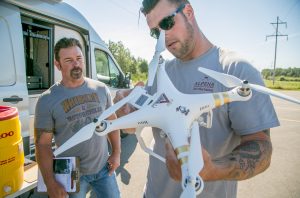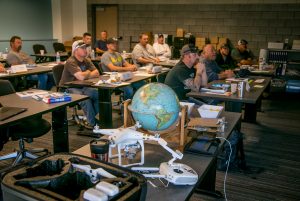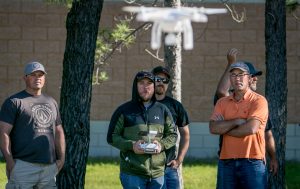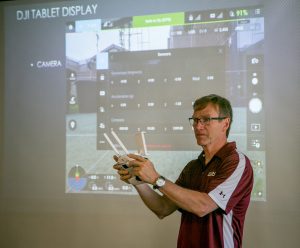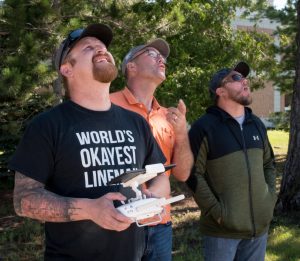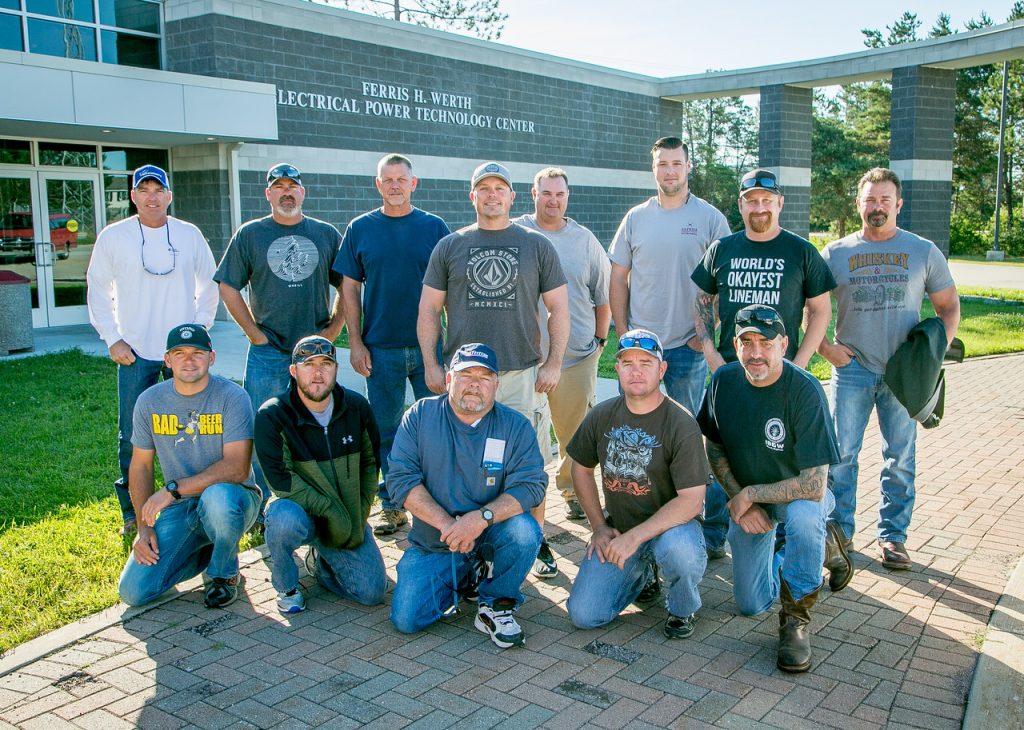
IBEW 1245 members at the Drone Training in Alpena, Michigan. Front row, left to right: Peter Winter, Nick Nelson, Dale Ingram, Randy Hudson, Casey Barker. Back row, left to right: Todd Van De Hey, Kasey Johnson, Richard Bimson, Danny Barber, James Noonkester, Will Thomas, Grant Todd, Ed Dolan
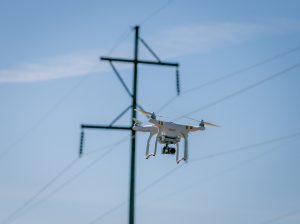 New technology is changing the utility industry in a number of ways, and unmanned aerial vehicles – more commonly known as drones – have the industry buzzing. Utilities all across the country are exploring the use of drones for a number of applications, including aerial patrols and inspections on a routine and emergency basis, pre- and post-construction job reviews, and finding access points in remote areas. While drones won’t take the place of helicopters, the impact to the environment is less with a drone as compared to a helicopter, and in areas where there are no-fly zones (frequently found in cities), drones can be very useful. Not to mention, drone use can present a big cost savings over helicopters in certain instances. Learn more here.
New technology is changing the utility industry in a number of ways, and unmanned aerial vehicles – more commonly known as drones – have the industry buzzing. Utilities all across the country are exploring the use of drones for a number of applications, including aerial patrols and inspections on a routine and emergency basis, pre- and post-construction job reviews, and finding access points in remote areas. While drones won’t take the place of helicopters, the impact to the environment is less with a drone as compared to a helicopter, and in areas where there are no-fly zones (frequently found in cities), drones can be very useful. Not to mention, drone use can present a big cost savings over helicopters in certain instances. Learn more here.
IBEW Local 1245 recognizes that drones are likely to become an increasingly integral part of the utility industry, and the union is serious about embracing the changing technology and keeping work in the hands of our members, which is why the union decided to sponsor and send a group of 12 union members to a Drone Pilot Prep Course this summer. The type of patrol and inspection that drones may be used for is bargaining unit work, and while we can’t fight the technological advances, we will fight to keep the work in-house.
In the early morning hours on July 23, I joined 12 members of IBEW Local 1245 as we set out for the drone training course, which took place at Alpena Community College in upstate Michigan. We took a diverse group of members, including Ed Dolan, Will Thomas, James Noonkester, Danny Barber, Richard Bimson and Todd Van De Hey from PG&E; Kasey Johnson and Nick Nelson from NV Energy; Randy Hudson and Peter Winter from SMUD; and Outside Line members Grant Todd and Dale Ingram.
We all met up in Phoenix to catch our connecting flight to Detroit. After a little mechanical problem with the plane we were off. When we arrived in Michigan, we rented a couple of vans and grabbed a quick bite to eat before heading to the campus, where we finally arrived around 1:30 in the morning.
After a bit of shut-eye, the members immediately got started with the prep course. They began with the classroom portion of the training, which included in-depth and detailed instruction surrounding FAA regulations and national air space. There was a lot of information to grasp, but the group stayed focused and took it all in. Brian Dawson, who is retired US Air Force, brought a wealth of knowledge and experience to the class and was an amazing instructor.
On Tuesday, the fun began. After a brief time in the classroom, half the group went out to practice patrolling a power line using a UAV, with all members getting a chance to fly the mission. The second half of the group stayed on campus and received training and hands-on practice doing up-close and detailed inspections of various elements.
Will Thomas, a GC Line MEO who has some prior experience building and operating drones at home, embraced the opportunity to work with a professional grade drone.
“Each person got to fly and get used to the controls of the machine, learn how to set the altitude, how to track the machine and keep our viewpoint on the power lines the whole time,” said Will Thomas. “It went great, and it was a lot of fun. It was a lot easier to fly than my drone, much more user-friendly.”
On Wednesday, instructor Brian Dawson went over weather, performance and loading of the drone, along with operations. We spent a great amount of time studying and reviewing for the FAA Part 107 Drone Certification Test, and all of our members completed the program feeling prepared to take and pass the required exam to become Licensed Drone Operators. Ed Dolan, James Noonkester, Dale Ingram, and Grant Todd all took and passed their test immediately after completing the training. The rest of the group will be testing over the next week.
Although the training was intensive, and there was a substantial amount of detailed class work, the group had a great time. The members are thankful that their union stepped up and took the initiative to send them on this training, and believe having this skill will serve them well in their respective jobs.
“In my classification, I’m in charge of penstock inspections and occasionally dam inspections,” said SMUD Hydro Operator Pete Winter. “On our concrete arch dams and penstocks coming into the power plants, there’s not a lot of access … so for me, the ability to fly into those spaces is really valuable.”
“I don’t think [drones] are going to change the way linework is done, but I do think it’s going to improve our accuracy, and it’s going to make our jobs easier and safer, which is really what we’re looking for in any new technology,” said Thomas.
It was a joy to attend and work with such a focused dedicated group. We would like to thank Brian Dawson, Dawn Stone and the rest of the staff at Alpena Community College for being wonderful hosts and making our visit to Northern Michigan a pleasure.
–Casey Barker, IBEW 1245 Business Rep
Photos and video by John Storey
